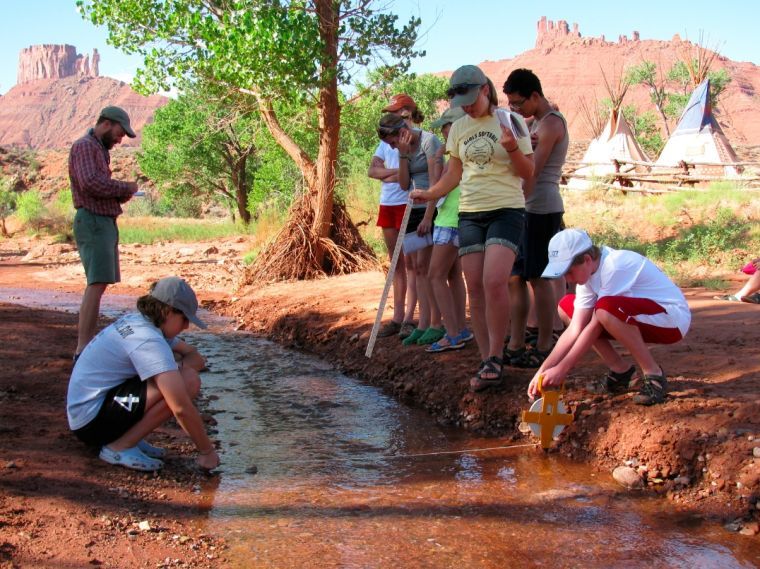Some information may be outdated.
How do you start your work week?
It probably isn’t in a group meeting that begins with an inspirational quote followed by your co-workers reports on what they noticed in nature over the weekend. But if your employer is the wilderness education and tour operator, Canyonlands Field Institute, that is exactly how each week beings.
“I love those conversations. It’s how I can still get excited about the meetings after so many years,” said Karla VanderZanden, the director and co-founder of Canyonlands Field Institute. “We foster an attitude that is honoring and investigative.”
VanderZanden knew that outdoor education was what she wanted to do from the time she got to college in Oregon. She was no stranger to the business: She attended summer camp as a child since she was eight years old and worked at a camp throughout high school.
After finishing college, she visited Colorado and moved to Moab in 1980, working as a river ranger for the Bureau of Land Management (BLM). In 1983 she and Robin Wilson started the Canyonlands Field Institute.
“My vision was to combine rivers, the concept of retreat in nature and camping,” VanderZanden said.
And though the institute has changed and evolved over the years, the non-profit organization tries to follow the same principles today as it did back then.
“Being very clear about our values and staying true to them, but remaining open about how to do them, has kept us successful,” VanderZanden said.
Another key to the institute’s success, the staff readily admits, is its location. Being surrounded by national parks, and such rich Native American and geologic history, has been a great help for the Canyonlands Field Institute, said Curtis Tripp, a Volunteers in Service to America (VISTA) volunteer working at the field institute.
The primary focus of the Canyonlands Field Institute is working with schools and youth groups to engender youth with a greater knowledge and appreciation for the wilderness, as well as the science to better understand it. Schools from all over the country come to the institute’s camps and classes, but the field institute’s real focus is on regional area schools. These local schools pay a very modest fee for the institute’s programs; a fee that is subsidized by the institute’s tourist tours as well as grant money.
Canyonlands Field Institute has been collaborating with the Grand County School District to improve students’ math and science test scores. By taking the students out into nature, and making science more relatable to them through real-world experience, VanderZanden hopes to see their test scores rise. She also hopes exposure to these disciplines will give students the option of choosing careers that will allow them to stay close to home.
The two main venues for the institute’s classes are their river running operation and their rustic Professor Valley Field Camp. Next year the field camp will be moving for the first time since its creation in 1987, from BLM land to private land.
In addition to the math and science components, a big focus of the Canyonlands Field Institute’s programs is on civic participation.
“One of the meta-lessons is how to be effective as a citizen. We want to empower kids to go to a city or county council meeting,” VanderZanden said. “We stress involvement rather than what to think or say.”
On one evening of the student’s five-day field program a mock town meeting is held to help students get a feel for this kind of engagement.
“The real focus (of the mock meeting) is looking at land use in different ways. Some of the kids were ranchers, some were conservationists, some were animals,” Tripp said. “It was really neat seeing the kids get into the process, conceptualize their role, and see how complicated these issues can be.”
Along with educational programs, Canyonlands Field Institute also offers national park tours and river trips for visitors to Grand County. These trips stay in the same vein as the educational programs by focusing on engagement with the area.
It is these charter trips and tours, along with many generous donors, that have allowed the field institute to continue funding and pursuing its mission of enjoyment, education and engagement for the last 29 years.
“The educational component is crucial to helping people appreciate this landscape. The appreciation is what builds the relationship,” said Faye Geiger, who worked with the Canyonlands Field Institute from 2002-2005.
Appreciate the coverage? Help keep local news alive.
Chip in to support the Moab Sun News.





